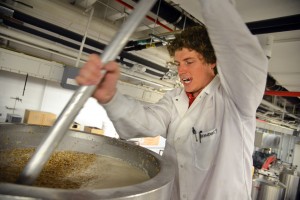 Food Science is the combined study of science and engineering to process, evaluate, package and distribute food. Students in this major study the chemical, biological, microbiological, nutritional, engineering and economic aspects of food. It is the application of principles from diverse scientific disciplines to develop new methods of processing, packaging, and distributing food. Food scientists seek to improve food flavor, color, texture, nutritional vale, safety, and cost through an understanding of the basic sciences. The nature of the food scientist work can vary based on the employer and products produced.
Food Science is the combined study of science and engineering to process, evaluate, package and distribute food. Students in this major study the chemical, biological, microbiological, nutritional, engineering and economic aspects of food. It is the application of principles from diverse scientific disciplines to develop new methods of processing, packaging, and distributing food. Food scientists seek to improve food flavor, color, texture, nutritional vale, safety, and cost through an understanding of the basic sciences. The nature of the food scientist work can vary based on the employer and products produced.
Students may choose from a concentration in science or technology. The science program is designed for students with interest in graduate school or for those desiring more rigorous science courses for technical careers in the food industry. Students more interested in business opportunities for technically trained individuals find the technology program permits greater flexibility in complementing Food Science coursework with business and agricultural commodity courses.
Courses include:
Food Science and the Consumer, Food Engineering, Muscle Foods and Eggs, Milk and Dairy Products, Principles of Human Nutrition, Quality Control of Food Products, Food Preservation, Processing Dairy Products, Food Laws and Regulations, Postharvest Physiology
| College | |
| Discipline |
|
| Academic Department |
|
| Departmental Contact | |
| Major Overview | |
| Plan Requirements | |
| Semester Sequence | |
| Related Majors | |
| Skills You Could Develop |
|
| Learn More About This Major |
|
| Career Titles | |
| Learn More About Careers |